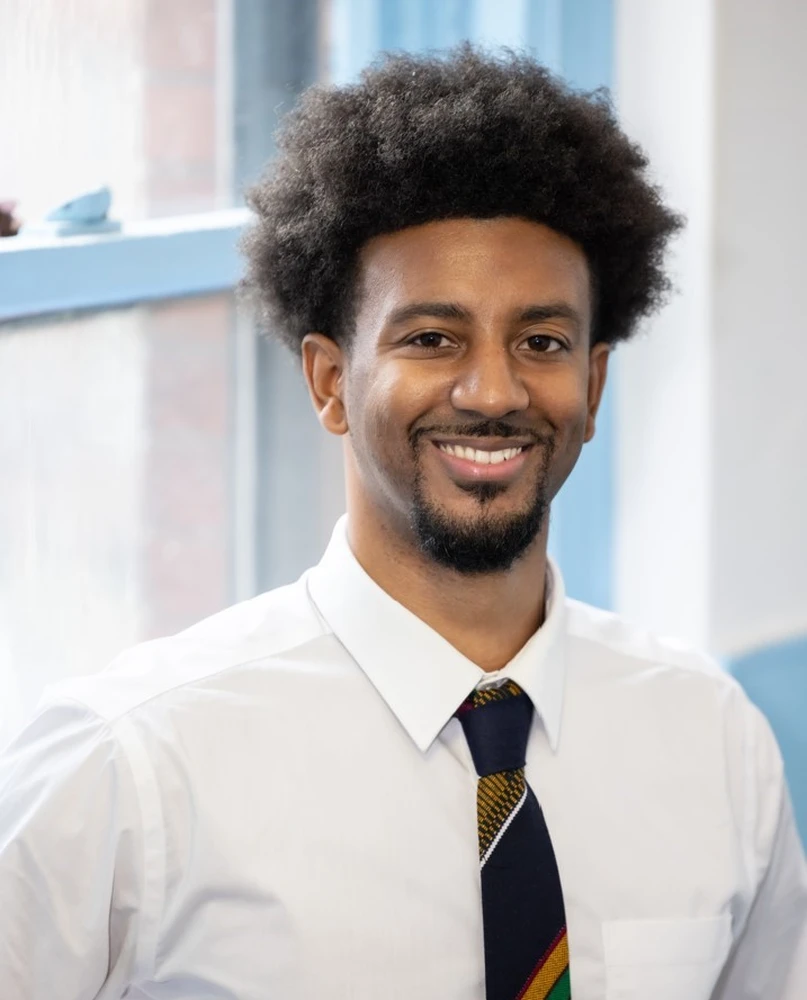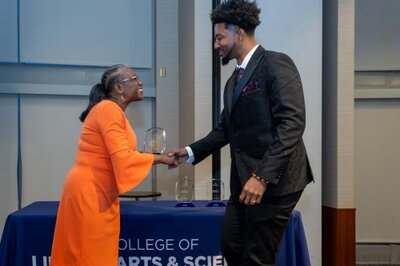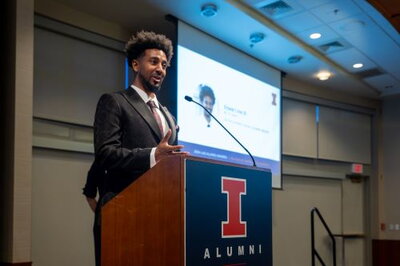
How Black history changed Ernest Crim III's life
When Ernest Crim III (BA, ’09, history) first started at the University of Illinois, he thought he wanted to be a psychology major. He was the friend that everyone confided in, so he thought “hey, maybe I want to be a psychologist, right?” Then, in the second semester of his freshman year, he took a Black history course taught by professor Clarence Lang that changed his life, and his major.
“I decided to take a Black history course, and I just absolutely fell in love with it and just learned more about my culture and the connection that I had back at home and in Africa. And I just kept going from there, honestly,” said Crim.
Today, 15 years after he graduated, Crim has been honored by the College of Liberal Arts & Sciences with the 2024 LAS Outstanding Young Alumni Award. The award is given to alumni who have demonstrated outstanding achievement, leadership, or service. Crim was honored for his work teaching the important role Black history plays in becoming culturally competent and equitable in the workplace, school, and broader community.
“I’m here because of [my family] and because, while at the best university in the world, I was able to take courses that educated me more about my culture and the world we live in, with an obligation to serve and make the world a better place,” Crim said during his acceptance remarks at the award ceremony.
On May 11, he returned to campus again as the speaker for the 2024 History and Philosophy convocation ceremony.
After graduating from the University of Illinois with a degree in history and minor in African American studies, Crim earned a master’s degree in secondary education and went on to teach in Chicago and Joliet, Illinois for 12 years. He has won multiple awards for teaching and activism.
In 2016, Crim and his wife, were the victims of a verbal racist attack which he recorded and posted online. The video garnered over 25 million views. The experience had a profound impact on Crim and led to a personal awakening. It drove him to begin creating online content to educate the public about Black history.
“I felt like I needed to do more to teach people how important knowing who you are could be to responding to situations like that,” he said. “But also, to help bridge that gap because I felt like our history courses didn't do enough of teaching everybody's history.”

The experience also inspired his best-selling first book, “Black History Saved My Life: How My Viral Hate Crime Led to an Awakening,” an autobiography that chronicles a lifetime of his experiences with racism and how learning about Black history gave him the knowledge, cultural competency, and passion to devote his life to teaching others.
His latest book, “The ABC’s of Affirming Black Children,” chronicles 26 artists, activists, scientists, and speakers who dared to be great in the face of injustice and adversity. He has also been a cast member on the PBS documentary “Divided We Fall.”
In “Black History Saved My Life,” he describes how at home he felt in that pivotal first history class.
“It was the first time in my life I was in an environment with my Black peers where intellectualism was celebrated and encouraged by everyone,” he writes. “I was so captivated by the discussion that day the only thing I put on my paper that class was the date. It became obvious as class concluded that day that I was in the right place. ... I felt myself coming alive.”
As the semester wound down and the class ended, Crim began to understand that teaching Black history was his calling.
“I began to see myself as Professor Lang on the stage, arousing a crowd of young adults on the importance of African American History in the present day as if I were a world-renowned rapper with my teaching assistants serving as my hype men and hype women,“ he writes. “This information needed to be taught to people like me. I was fortunate enough to able to make it this far in life without having an in-depth understanding of the intricacies of my history, but what about those who weren’t as fortunate?”
In his sophomore year, Crim signed up for African American Studies 100 taught by professor Abdul Alkalimat. Crim describes Alkalimat and the course as solidifying his decision to become a teacher.
“He just taught our history with so much passion. It made clear just everything I had a question about growing up in Chicago on the South Side,” he said. “He just illuminated those things for me and made me have a true passion for reading and learning more about who I was.”

In addition to Alkalimat and Lang, Crim cites professor Ruby Mendenhall as an influence and said she taught him the importance of connecting history to current events.
“That was during the time when Obama was running for election, and she always brought in those current events to the class and connected it to what we were studying, which made me understand that when I'm teaching history, I have to make sure I can bring in these contemporary issues, because otherwise, you know, why are we even talking about the past if we don't understand that direct connection,” he said.
While at the University of Illinois Crim also took his first steps into political activism. He started a Facebook group called “Students Against Stereotypes” and during his freshman year, protested against white fraternity and sorority students who hosted parties that encouraged students to attend dressed up as racial stereotypes. The actions of Crim and other students resulted in sanctions for the Greek houses involved in the incidents. In “Black History Saved My Life” he describes the experience as a significant moment.
“I was able to see and experience for the first time in my life the result of direct civic action in the form of peaceful protest,” he writes.
The experience spurred further political engagement and he remains involved in activism today.
In 2022, Crim left his job at Joliet Central because he felt he could make a larger impact working outside of the education system. Today, he is the founder of Crim’s Cultural Consulting. Through his work, he speaks to companies, middle and high schools, educators, colleges, and community groups and uses Black historical narratives to empower and educate. He also creates TikTok content on Black history and has over 750,000 followers across all social media platforms. He has collaborated with, or been featured on, platforms such as CBS, CNN, ABC, HBO & The Washington Post. He considers himself a public teacher and not just a speaker.
“When I’m speaking to an audience, I’m also making sure that I’m teaching specific lessons that I would in a classroom setting. We're still not teaching kids a wide range of our history. We're not teaching it in a way that could allow us to correct the mistakes and errors of the past,” he said. “When you are a student of history, you understand that you get a limited amount of time here. This earth has been here for billions of years, so we're a speck. So I'm just doing a little bit and, understanding that, you know, there's so much more that we can all still do.”
Title
LAS alumni spotlight: Ernest Crim III
The College of LAS interviewed Ernest Crim III on the day he received the 2024 Outstanding Alumni Award.